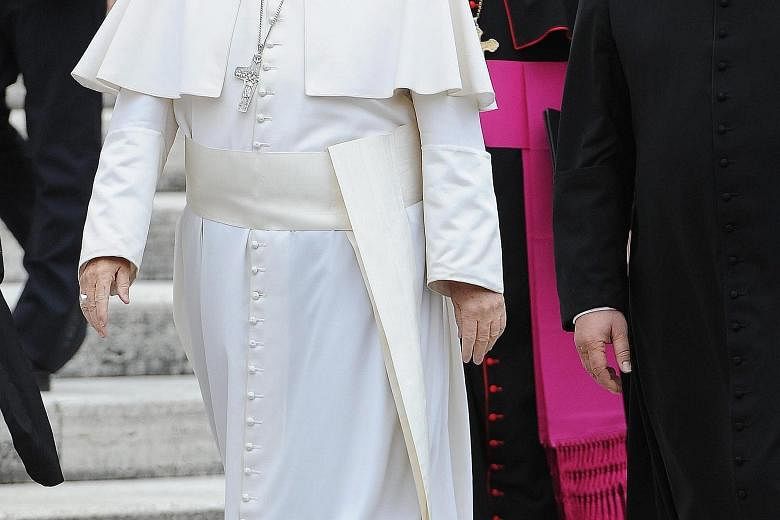VATICAN CITY • Pope Francis encouraged bishops from more than 120 countries to speak freely when they gathered at the Vatican nearly three weeks ago for a broad discussion of family matters related to the world's 1.2 billion Roman Catholics.
And speak freely, they have.
The result has been the most momentous, and contentious, meeting of bishops in the 50 years since the Second Vatican Council, which brought the Church into the modern era. The meeting has exposed deep fault lines between traditionalists focused on shoring up doctrine and those who want the Church to be more open to Catholics who are divorced, gay, single parents or cohabiting.
As the bishops face a deadline tomorrow to present their report to the Pope, it is increasingly clear that Pope Francis is struggling to build consensus for his vision of a more inclusive and decentralised Church.
The question is whether the Pope, who has won the hearts of those in the pews, can persuade the bishops to help create a Church that fully welcomes people with the kinds of family situations it now condemns.
The synod meetings are closed to the media but, at daily briefings, bishops have said that Pope Francis appears serene and quite pleased to have uncorked a genuine debate.
Tomorrow, the synod's final report is expected to be published and the 270 participating bishops, known as synod fathers, will vote up or down on each passage.
Progressives, led by the contingent from Germany, are pushing for a Church that is more welcoming towards divorced, gay and other parishioners who are not living the Catholic ideal of family. The German bishops have found allies among some prelates from Western Europe, Asia and the Americas.
The traditionalists - whose standard bearers are the African and Eastern European bishops - have resisted any proposals that appear to soften the Church's doctrine that marriage is "indissoluble" and homosexuality is "intrinsically disordered".
The synod can make recommendations, but unlike the three-year-long Second Vatican Council, it cannot make decisions. That power lies with the Pope.
Pope Francis is expected to speak this weekend, giving him the last word after the bishops vote on their final report. But it could be many months before he issues an official document on the Church's approach to family issues, and it has not been determined what that document will cover and what weight it will have, several Vatican spokesmen have said.
But Pope Francis has already tipped his hand in several ways.
He has called for a "Jubilee Year of Mercy" to begin on Dec 8, on the feast of the Immaculate Conception - in keeping with his consistent theme that mercy trumps judgment. During the Year of Mercy, he will allow priests worldwide to absolve women who confess to having had abortions, a power usually reserved for bishops.
By opening up discussion on what had long been taboo topics, Pope Francis has both electrified and terrified the Church's hierarchy. Cardinal Reinhard Marx, the archbishop of Munich and Freising, Germany, said in an interview on Tuesday night that some synod fathers "are fearful of any change".
"That I can't understand because Church history is living tradition," not something static, Cardinal Marx said. "We are not a castle to be defended, surrounded by enemies."
NEW YORK TIMES

